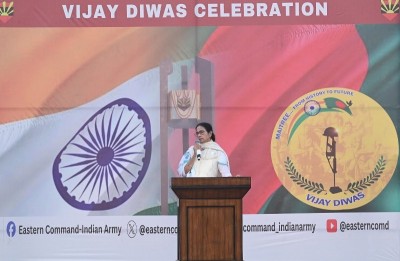
Pakistani writer and ex-diplomat Haqqani says supporting terror factory in Kashmir "failed"
New Delhi/Washington, Mar 2 (UNI//IBNS) In a season when Indian's western neighbour has come under intense international pressure even from its trusted allies, a prominent Pakistani writer and a former ambassador of Pakistan to the United States Husain Haqqani has said that Islamabad's three-decade old 'strategy of supporting' militancy in J&K has failed.
"It might be a bitter pill to swallow for some Pakistanis, but Pakistan’s 30-year strategy of supporting insurgents and militants in Kashmir (J&K) has failed. Pakistan’s policy has made life more difficult for the Kashmiri Muslims it claims to support," Haqqani writes in an article in 'Washington Post'.
"Violence supported from across the border has resulted in an Indian clampdown and obscured international concern about human rights in Kashmir," he says.
In remarks which can be seen as calling spade a spade, Haqqani further says - ".... Pakistan’s support for terrorist groups is well documented, even as it has been officially denied by successive Pakistani governments".
Pakistan-based groups, operating openly despite official bans, have often been eager to claim responsibility for attacks inside India, he says.
Commenting on the latest developments in Indo-Pak relations, he also says in strategic point of view, lately the Modi government seems to have "found a soft spot where it can strike — whether on ground using special forces, as in 2016, or using air strikes as they have in the current crisis (Feb 26 Balakot attack) — without crossing the threshold for all-out war between the nuclear powers".
Thus says Haqqani, who also authored the book 'Reimagining Pakistan: Transforming a Dysfunctional Nuclear State', -- "In military terms, Pakistan’s military-intelligence establishment counts on India’s fear of conflict escalating to the nuclear level while planning terrorist attacks. Instead of nuclear weapons being a deterrent to war, this approach allows for low-cost, low-intensity war, which can be carried on endlessly under a nuclear umbrella".
He also suggests - what many in India even at official levels have said - "Pakistan released an Indian pilot (Abhinandan) shot down in Pakistani-controlled territory amidst rising hostilities. But the peace gesture, as Pakistani Prime Minister Imran Khan called it, is unlikely to end the conflict...to truly end hostilities, Pakistan must shut down support for terrorist groups."
Image: UNI
Support Our Journalism
We cannot do without you.. your contribution supports unbiased journalism
IBNS is not driven by any ism- not wokeism, not racism, not skewed secularism, not hyper right-wing or left liberal ideals, nor by any hardline religious beliefs or hyper nationalism. We want to serve you good old objective news, as they are. We do not judge or preach. We let people decide for themselves. We only try to present factual and well-sourced news.







